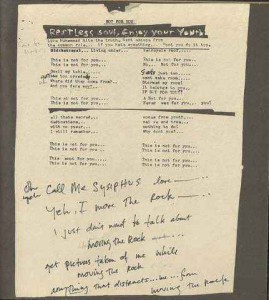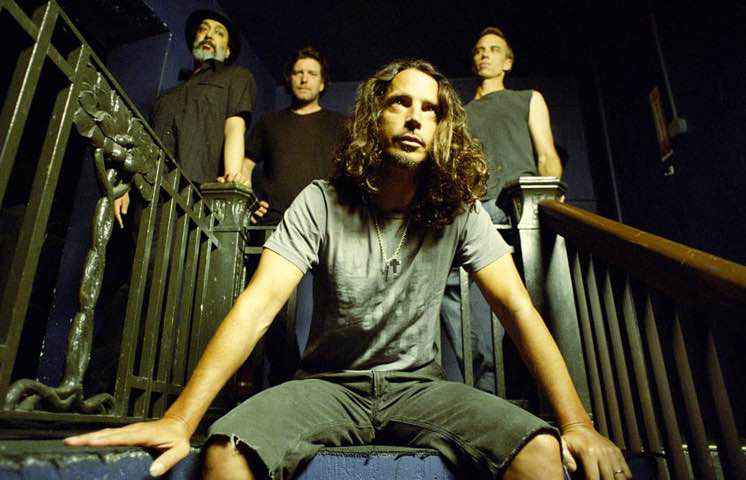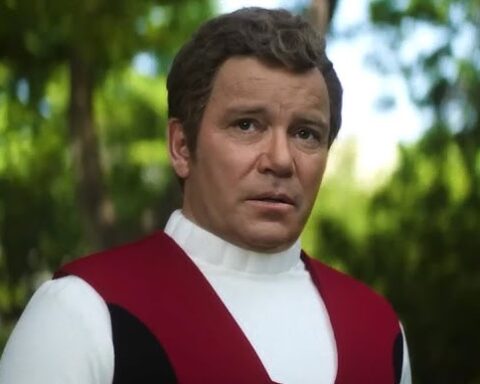December marked 20 years since the release of Pearl Jam’s third album, Vitalogy, in 1994. While I’m not sure how many fans would consider it Pearl Jam’s best album, it is certainly their strangest strangest and most awkward.
Vitalogy could be said to have marked the first conscious step in the direction away from the kind of insane commercial success PJ had experienced with their first two albums.
According to statements made in interviews at the time, they were literally intent on shrinking the size of their audience to a more manageable level; a process that had already begun with the refusal to do interviews or to make any music videos for the Vs album at a time when MTV play had everything to do with how successful bands were.
Eddie Vedder in particular was struggling with his fame and with the generational spokesperson stigma that both he and Kurt Cobain had been burdened with by journalists, which neither of them had sought or had been happy with; Vitalogy and No Code two years later had Pearl Jam setting out a new direction for themselves both commercially and somewhat creatively.
Tensions within the band were at their height at this period, with Stone Gossard on the verge of quitting, Mike McCready going into rehab to be treated for alcohol and cocaine abuse (which led McCready into Mad Season with Layne Staley in 1994), and a drummer on the verge of being vetoed. Gossard went on record as having said the band was finding it very difficult to collaborate and that it became the first album in which Eddie made the final decisions.
That particular fact may have had a lot to do with how complex and fragmented the album ended up being and also how interesting and experimental. Mike McCready’s sprawling, often overdone guitar solos that characterised large parts of Ten were mostly absent on Vitalogy, with Vedder taking a more firmly driving role in the instrumental aspect of the songs, himself playing guitar on several songs for the first time in Pearl Jam; this shift in dynamic allowed for some much more direct song structures, for one thing.
Most of the band had got hair-cuts too, stepping firmly away from the overly ‘classic rock’ stigma that had formed around the band with the breakthrough and groundbreaking Ten.
Vitalogy was also recorded in the shadow cast by the death of Cobain earlier in the year, which had effected Vedder very deeply and led to a troubled state of mind that was especially evident from the somewhat notorious Melody Maker interview in May 1994.

Pearl Jam at this time were the biggest band in America and one of the biggest acts in the world, and their third album, a follow-up to 1993’s record-breaking Vs, was the most highly anticipated rock release of the year.
It is now also regarded as the last album where PJ were, in commercial terms, still regarded as the biggest rock act on the planet; by the time No Code was released two years later, the band was no longer doing the same ‘business’ and was, in its own terms, much happier for it.
The band also continued its boycott against Ticketmaster during its tour of the United States, refusing to play in Ticketmaster’s venue areas, but virtually no other bands or artists joined PJ in this act of noble, well-meaning rebellion against the corporate leviathan.

To further confound the commercial release process for Vitalogy, the band that had already stopped making music videos, insisted on a vinyl-only release for the first week, with CDs and cassettes following later. It is an indication of the band’s popularity that the album charted significantly in that opening week despite only being available in vinyl format.
Vitalogy in fact became (at the time) the second fastest-selling album in history, only behind their own Vs album of the previous year.
The original title for the album was supposedly Life; gleaned from the early 20th Century medical book on which the album’s fascinating cover art and liner notes were based (Vitalogy literally means “the study of life.”). The Vitalogy booklet is in fact one of the coolest things about the album and one of the things I most remember about it.
Vedder, the story goes, found the medical book at a garage sale.
The booklet contains outdated discussions of health and well-being, with quaint pictures and explanations. I remember spending ages looking through that little booklet and trying to make sense of it with my insufficient 15-year-old mind, while the cassette tape of the album revolved awkwardly in my tape-player, often getting jammed (it repeatedly jammed halfway through ‘Nothingman’ for some reason).

I still flick through that little booklet every now and then, remembering how fascinating Vitalogy was both as an album and as an overall package.
So what of the music itself? Not as polished or mass-friendly as Ten and not as immediately gratifying as Vs, Vitalogy was a more difficult album on first listen; a strange, awkward collection of diverse songs, representing a band in strange, awkward moment in its journey.
There are radio-friendly, sing-a-long tracks that would’ve been just as comfortable on Ten or Vs, such as ‘Betterman’ and ‘Nothingman’, while something as straight-ahead pop-rock as ‘Corduroy’ would be a permanent live standard, though it’s a song that is lyrically and thematically much less friendly as it appears sonically. But the blistering ‘Spin the Black Circle’ was the heaviest thing PJ had ever done (and was put out as the first single; amusingly in the book Pearl Jam Twenty, Vedder recalled the song took shape after he accidentally listened to guitarist Stone Gossard’s demo at the wrong speed), while the brooding and angry ‘Not For You’ is probably the most palpably angry and hostile Vedder has ever been on record: sings Eddie, ‘Restless soul, endure your youth/Like Mohammad, it’s the truth/can’t escape from the common rule/If you hate something, don’t you do it too?’
‘Immortality’ is an epic, brooding, darker piece that really seemed to represent a moment, a mood, in time.
That song, more than any other, seemed to resonate with the ending of the Cobain story, though Vedder has personally said the lyrics weren’t specifically about Kurt. Then there was the really odd stuff; ‘Bugs’, which when I first heard it I felt was a waste of a track, but by second listen had fallen in love with. ‘Aye Davanita’, a repeating mantra-like piece of music that I still maintain was a waste of a track.
And ‘Stupid Mop’ (or “Hey Foxymophandlemama, That’s Me”, as it’s also known), which remains a disturbing and impenetrable enigma of a track, particularly as a way of closing an album; though perhaps fittingly it is a thing of confusion (created using looped recordings of real patients from a psychiatric hospital).
I’m not sure, even having scrutinised the compelling Vitalogy booklet, what the underlying theme of the album is (or if there is one at all), as the ‘study of life’ motif seems more a loose exterior framework and not necessarily the theme of the lyrics (fame and the cultural hijacking of music into commodity are themes that recur, while the Devil makes a few appearances); but there’s definitely something intangible that binds all the songs together, some ineffable, unifying spirit or feeling.
It remains Pearl Jam’s darkest album for sure, and maybe that’s why I retain a special fondness and fascination for it. It was also released at a time when I was actively hoping Pearl Jam *would* release another record and not implode or fade away (as had seemed possible earlier in the year), so was genuinely grateful to *have* another PJ album at all, even if it was an odd, uncertain one.
This was also the album more than any other that made me feel Pearl Jam were The Doors of their generation, with Eddie the Jim Morrison type (at least at that point in time); even now when I listen to Vitalogy I can easily imagine ‘Last Exit’, ‘Not For You’, ‘Tremor Christ’ and especially things like ‘Bugs’ and ‘Aye Davanita’ being Morrison-fronted Doors numbers in the late sixties.
Vedder’s voice, which if we’re honest has lost a lot of its sonic power over time, was still at its most powerful in parts of Vitalogy, for example in parts of ‘Last Exit’ or ‘Tremor Christ’ where his blistering vocals sound like they could bring buildings down.

Is it one of the PJ’s best works? As a whole, probably yes.
For me, Vs is still the best PJ album, while I would argue for No Code or Binaural as my personal favourite Pearl Jam release. But Vitalogy is a work of such diversity and extremes that it is difficult to ever overlook; and I’m sure it’s someone‘s favorite album (PJ fans are an extraordinarily diverse and opinionated bunch, not to mention loyal and passionate). Songs like the overly syrupy ‘Betterman’ or ‘Nothingman’ have never been among my favourites, but I still flinch at how palpably vitriolic and angry (and how good) the stomping ‘Not For You’ is and how moodily compelling ‘Immortality’ still is when I listen to it. I still wonder at ‘Stupid Mop’ (I have a fellow musician friend who still can’t listen to that track, finding it too disturbing), and I still want to mosh like crazy to ‘Spin the Black Circle’ as soon as I hear those opening chords.
For that matter, ‘Last Exit’ and ‘Tremor Christ’ are both also great, engaging songs, the latter being a particularly underrated entry in Pearl Jam’s vast discography. Even now, when I see Pearl Jam live, at least two or three of the songs I’ve got my fingers crossed for are Vitalogy songs.
As a whole, Vitalogy, it might be fair to say, is PJ’s bravest and most uncompromised album.
As a final thought, I’ve always imagined how much more ‘complete’ the album might’ve felt had both ‘The Long Road’ (later featured on the Dead Man Walking soundtrack and famously rendered with great depth by collaboration with Qawwali legend Nusrat Fateh Ali Khan) and the frankly glorious ‘I Got ID’ (released on an EP the next year) been recorded for Vitalogy and included on the album; they would’ve completed the album beautifully.
That’s just fan-boy fantasising, however.
As it is, Vitalogy is an imperfect entity, but endearingly so. I also get the impression it was deliberately so. Which, you could argue, makes it all the more special.





Pearl Jam could’ve taken the easy way out. They were massive, in some ways bigger than Nirvana, because they were slightly more accessible than Nirvana, and Kurt Cobain was deliberately antagonistic towards the media and cult of celebrity. But Pearl did what few had the courage to do, they made music without worrying about hit singles and record sales. It’s ironic they were accused of being sellouts when they first came out. I’ve always respected their integrity and it’s great to see they’re still making music
They lose a lot of edge by carrying on and having a career so long, as opposed to that cult aura that surrounds Nirvana for having a very short musical life. I think it’s a double-edged sword, having a long career.
Vitalogy was ok in some ways. I confess I’m not really much of a PJ fan really, even though I have to confess that I was back when records like this one was coming out. I too like albums such as No Code much more nowadays. Looking back, I think songs like “Aye Davanita” might have been one of Jeff Aments little experimentations into stuff that eventually became the staple of his work with Three Fish. Super hippie, drum-circley stuff.
I guess I also never really totally bought the whole meme about Vedder hating his “status as a gen X icon” or whatever. It’s he spoke out about how much he supposedly hated it all the time, yet at the same time was taking a more “executive” role of the band during this time… How else could he even rationalize such a thing to the other band members, without some kind of unspoken appeal to his “iconic” rocker status in the music media..? TEN was recorded instrumentally before he even came in and laid in the vocals, yet two albums later he’s the one making the final “decisions” about songs, even instrumental questions? To me that says a lot about the true nature of Ed, as opposed to the persona he was constantly trying to shape for herself in the public eye…
I don’t know, man; Vedder’s still one of my heroes, though he’s gotten a little more ‘rock-starey’ in the last few years. But I didn’t perceive any insincerity in him, in my opinion; he always seemed pretty consistent. But I acknowledge that it’s a matter of opinion. I’m glad you like ‘No Code’ though – it’s a very special album.